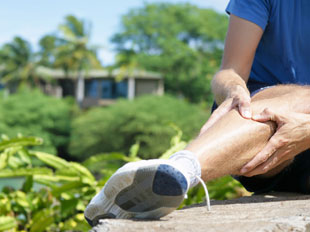Cramp in Your Style
 From side stitches while jogging to painful Charlie horses in the middle of the night, cramps don’t discriminate.
From side stitches while jogging to painful Charlie horses in the middle of the night, cramps don’t discriminate.
While most spasms are innocent, some can be signs of medical issues like diabetes, circulatory problems, kidney disease, or thyroid conditions. And certain drugs (oral contraceptives, diuretics used to treat hypertension, and some asthma medication) can cause muscle constrictions and aches, thanks to their depletion of minerals that maintain muscular elasticity.
Fend off twinges with these preventive measures:
- Drink plenty of water, especially leading up to and after exercise. But be careful not to guzzle, which can contribute to cramping.
- Stretch out your calves before bed by pulling the toes toward your shins. Gently massage in the direction of the heart to stimulate circulation and relax fibers.
- Get enough daily calcium (1000–1200 mg), magnesium (400–420 mg for men, 310–320 for women), and potassium (4700 mg).
When a cramp strikes, stop or slow your exercise and gently massage or stretch the offending area. If you’re stricken with a nocturnal coil, do the same but remain in bed — many cramps can keep you from standing or walking properly. Heat packs can help relax the knot (they’re recommended for menstrual cramps as well).

